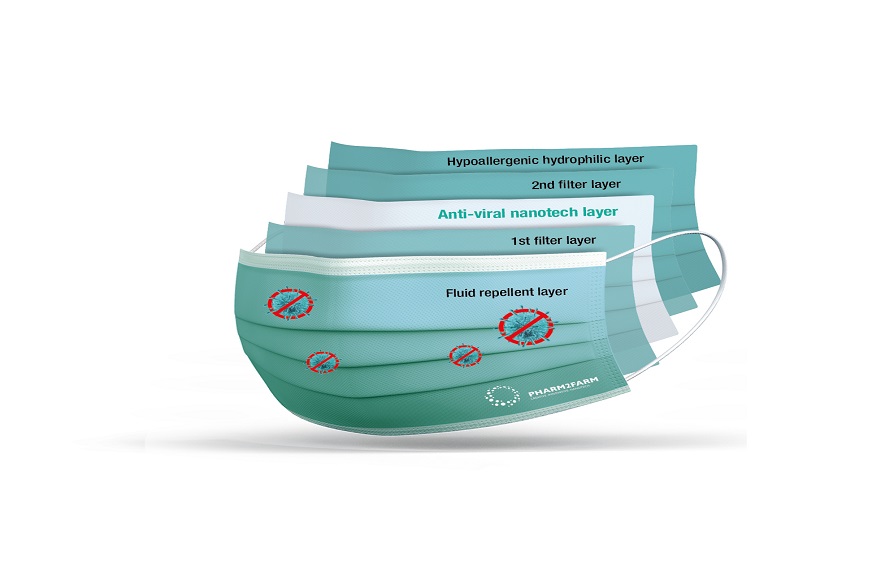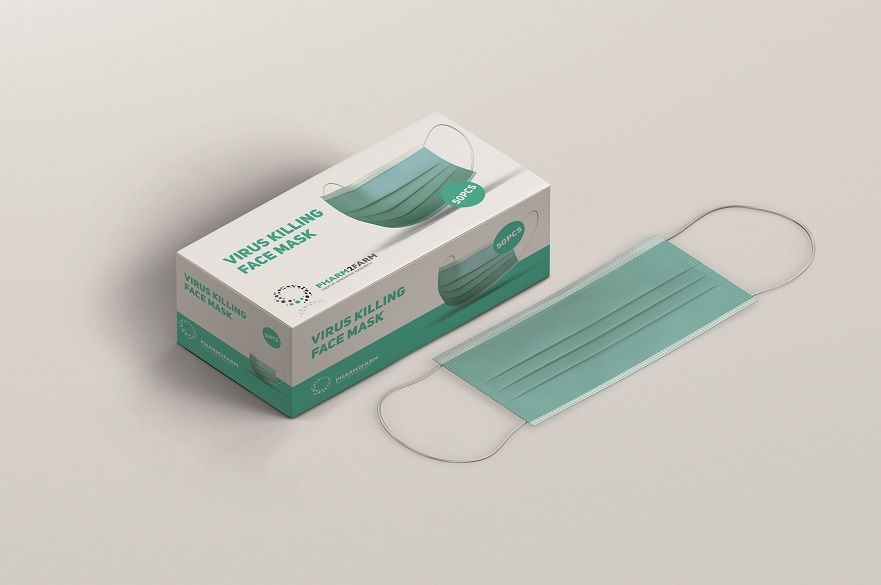Scientists develop facemask which can kill viruses on contact
A new antiviral facemask which uses nanotechnology to kill viruses including COVID-19 and influenza has been designed and developed by a Nottingham Trent University scientist.
By Dave Rogers | Published on 9 November 2020
Categories: Press office; Research; School of Science and Technology;

Instead of the usual three-ply design, the five-ply surgical mask includes an additional antiviral inner layer which incorporates nano-copper created using a patented process developed at the university.
The copper, which is embedded into the mask material, has ions that are emitted once in contact with a virus and this then creates an interaction with the virus’s genetic material causing it to die and stop reproducing.
Because they are spherical, nanoparticles have a large surface area making the approach more effective at killing the virus. The antiviral inner layer ensures additional protection for both the wearer and those in proximity.
The mask has been designed by Nottingham Trent University scientist and nanotechnology expert, Dr Gareth Cave, and is now being commercialised by NTU spin out company Pharm2Farm in Nottingham’s BioCity.
The company, which was founded by Dr Cave, uses a patented process to produce and functionalise nanoparticles for a range of human, crop and animal health benefits.
Tests showed that the masks, which are Type IIR – meaning they offer the highest level of protection and have a filtration efficiency of 99.98% – were highly effective, at killing more than 90% of the influenza and coronavirus over seven hours, and have been certified to ISO 18184 standards.
The masks include a fluid-repellent layer on the outside - to reduce inhalation of droplets of saliva and mucus that carry COVID-19 – the antiviral nanotech layer between two filter layers, and a hypoallergenic breathable innermost layer.
While current conventional surgical masks block the virus, it can remain on or in the mask while being worn and after it has been disposed of.
The masks are expected to go into production in Nottingham later this month and will be commercially available from December for healthcare, transport and food service settings initially.

Despite the additional layer and the antiviral properties, the masks will be in line with current Type IIR mask prices.
“It’s exciting to see our technology move forward and make a real impact towards the fight against the spread of COVID-19,” said Dr Cave, who is based in Nottingham Trent University’s School of Science and Technology.
He said: “The mask we’ve developed has been proven to inactivate viruses upon contact; the antiviral layer kills virus which has been blocked by the filter layers. The challenge with conventional surgical-type masks is that they only block virus from entering or exiting the mask. They don’t have an active mechanism for killing it once it’s trapped in the mask.
“Our new antiviral mask has been designed to utilise the existing barrier technology and combine it with our nanotechnology to kill the virus once it is trapped there.
“We’ve added the barrier layer to both sides of the mask so not only does it protect the wearer but also those around. By killing the virus on contact, it also means that the used face mask can be safely disposed of and not be a potential source of passive transfer.”
The masks have been designed and tested following an Innovate UK grant, as part of UK Research and Innovation’s response to COVID-19.
Notes for Editors
Press enquiries please contact Dave Rogers, Public Relations Manager, on telephone +44 (0)115 848 8782, or via email.
NTU was named University of the Year 2019 in the Guardian University Awards. The award was based on performance and improvement in the Guardian University Guide, retention of students from low-participation areas and attainment of BME students. NTU was also the Times Higher Education University of the Year 2017, and The Times and Sunday Times Modern University of the Year 2018. These awards recognise NTU for its high levels of student satisfaction, its quality of teaching, its engagement with employers, and its overall student experience.
The university has been rated Gold in the Government’s Teaching Excellence Framework – the highest ranking available.
It is one of the largest UK universities. With nearly 32,000 students and more than 4,000 staff located across four campuses, the University contributes £900m to the UK economy every year. With an international student population of more than 3,000 from around 100 countries, the University prides itself on its global outlook
The university is passionate about creating opportunities and its extensive outreach programme is designed to enable NTU to be a vehicle for social mobility. NTU is among the UK’s top five recruiters of students from disadvantaged backgrounds and was awarded University of the Year in the UK Social Mobility Awards 2019. A total of 82% of its graduates go on to graduate entry employment or graduate entry education or training within six months of leaving. Student satisfaction is high: NTU achieved an 87% satisfaction score in the 2019 National Student Survey.
A total of 82% of its graduates go on to graduate entry employment or graduate entry education or training within six months of leaving. Student satisfaction is high: NTU achieved an 87% satisfaction score in the 2019 National Student Survey.